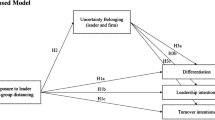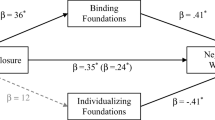Abstract
Prior research has shown that women report mostly negative expectations about being a gender-token in male-dominated work groups. We speculate that this is partially caused by the socially ascribed status devaluation of women. In this study we investigated the degree to which elevated social status may lessen negative expectations of gender-token women assigned to leadership positions. Sixty-three undergraduate women participated in 1 of 3 tokenism conditions: (1) nontoken, (2) gender-token, and (3) high-status gender-token. In all conditions participants were led to believe that they would be leading a group of men in a decision-making exercise. Leader expectations were then assessed. The results suggest that increased social status may help prevent gender-token women from developing negative expectations about interactions with male-dominated work groups.
Similar content being viewed by others
references
Al-Rasheed, A., & Dawlah, J. A. (2002). Factors affecting women's attitudes toward obstacles facing their career advancement and their empowering strategies in Jordanian business organizations. Administrative Sciences, 29, 48-72.
Baron, R. A., & Byrne, D. (1991). Social psychology. Boston: Allyn & Bacon.
Berger, J., & Zelditch, M. (Eds.). (1985). Status, rewards, and influence. San Francisco: Jossey-Bass.
Bielby, W., & Baron, J. (1986). Women and men at work: Sex segregation and statistical discrimination. American Journal of Sociology, 91, 759-799.
Budig, M. J. (2002). Male advantage and the gender composition of jobs: Who rides the glass escalator? Social Problems, 49, 258-277.
Budig, M. J., & England, P. (2001). The wage penalty for motherhood. American Sociological Review, 66, 204-225.
Burke, R. J. (2001). Organizational values, work experiences, and satisfactions among managerial and professional women. Journal of Management Development, 20, 346-353.
Carli, L. (1990). Gender, language, and influence. Journal of Personality and Social Psychology, 59, 941-951.
Cohen, L. L., & Swim, J. K. (1995). The differential impact of gender ratios on women and men: Tokenism, self-confidence, and expectations. Personality and Social Psychology Bulletin, 21, 876-883.
England, P. (1992). Comparable worth: Theories and evidence. Hawthorne, NY: Aldine de Gruyter.
England, P., Reid, L. L., & Kilbourne, B. S. (1996). The effect of the sex composition of jobs on starting wages in an organization: Findings from the NLSY. Demography, 33, 511-521.
Fairhurst, G. T., & Snavely, B. K. (1981). An examination of the communication between high status tokens and their dominant colleagues: Kanter's theory reexamined. Academy of Management Journal, 26, 353-361.
Fairhurst, G. T., & Snavely, B. K. (1983). Majority and token minority group relationships: Power acquisition and communication. Academy of Management Review, 8, 292-300.
Floge, L., & Merrill, D. M. (1986). Tokenism reconsidered: Male nurses and female physicians in a hospital setting. Social Forces, 64, 925-947.
Grant, J. (1988). Women as managers: What they can offer to organizations. Organizational Dynamics, 16, 56-63.
Greed, C. (2000). Women in the construction professions: Achieving critical mass. Gender, Work, and Organization, 7, 181-196.
Hammond, J., & Mahoney, C. (1983). Reward–cost balancing among women coal miners. Sex Roles, 9, 17-29.
Hopcroft, R. (2002). Is gender still a status characteristic? Current Research in Social Psychology. Retrieved from http://www.uiowa.edu/grpproc/crisp/7.20.htm, retrieval date 10/7/02
Kanter, R. M. (1977a). Men and women of the corporation. New York: Basic Books.
Kanter, R. M. (1977b). Some effects of proportions on group life: Skewed sex ratios and responses to token women. American Journal of Sociology, 82, 965-990.
Kasof, J. (1993). Sex bias in the names of stimulus persons. Psychological Bulletin, 113, 140-163.
Konrad, A. M., & Cannings, K. (1997). The effects of gender role congruence and statistical discrimination on managerial advancement. Human Relations, 50, 1305-1313.
Linehan, M. (2002). Senior female international managers: Empirical evidence from Western Europe. International Journal of Human Resources Management, 13, 802-814.
Loden, M. (1985). Feminine leadership, or how to succeed in business without being one of the boys. New York: Times Books.
Martinson, T. H., & Crocetti, G. (Eds.). (1987). Graduate Record Examination general text (2nd ed.). New York: Prentice-Hall.
Ott, E. M. (1989). The effects of the male–female ratio at work. Psychology of Women Quarterly, 13, 41-57.
Powell, G. (1997). Leadership and gender: Vive la difference? In M. R. Walsh (Ed.), Women, men, & gender: Ongoing debates (pp. 298-305). New Haven, CT: Yale University Press.
Reskin, B. (1988). Bringing men back in: Sex differentiation and the devaluation of women's work. Gender and Society, 2, 58-81.
Ridgeway, C. L., Johnson, C., & Diekema, D. (1994). External status, legitimacy, and compliance in male and female groups. Social Forces, 72, 1051-1077.
Rosener, J. B. (1995). America's competitive secret: Utilizing women as a management strategy. New York: Oxford University Press.
Rothstein, M. G., Burke, R. J., & Bristor, J. M. (2001). Structural characteristics and support benefits in the interpersonal networks of women and men in management. International Journal of Organizational Analysis, 9, 4-25.
Snodgrass, S. E. (1985). Women's intuition: The effect of subordinate role on interpersonal sensitivity. Journal of Personality and Social Psychology, 49, 146-155.
Snodgrass, S. E. (1992). Further effects of role versus gender on interpersonal sensitivity. Journal of Personality and Social Psychology, 62, 154-158.
Spangler, E., Gordon, M., & Pipkin, R. (1978). Token women: An empirical test of Kanter's hypothesis. American Journal of Sociology, 84, 160-170.
Tsui, A. S., & O'Reilly, C. A., III (1989). Beyond simple demographic effects: The importance of relational demography in superior–subordinate dyads. Academy of Management Journal, 32, 402-423.
Webster, M., & Driskell, D. G. (1985). Status generalization. In J. Berger & M. Zelditch (Eds.), Status, rewards, and influence (pp. 108-141). San Francisco: Jossey-Bass.
Williams, C. L. (1992). The glass escalator: Hidden advantages for men in “female” professions. Social Problems, 39, 253-267.
Yoder, J. D. (1991). Rethinking tokenism: Looking beyond numbers. Gender and Society, 5, 178-192.
Yoder, J. D., Adams, J., & Prince, H. (1983). The price of a token. Journal of Political and Military Sociology, 11, 269-276.
Yoder, J. D., & McDonald, T. W. (1998). Measuring sexist discrimination in the workplace: Support for the validity of the Schedule of Sexist Events. Psychology of Women Quarterly, 22, 487-491.
Yoder, J. D., Schleicher, T. S., & McDonald, T. W. (1998). Empowering token women leaders: The importance of organizationally legitimated credibility. Psychology of Women Quarterly, 22, 209-222.
Yoder, J. D., & Sinnett, J. (1985). Is it all in the numbers? A case study of tokenism. Psychology of Women Quarterly, 9, 413-418.
Zimmer, L. (1988). Tokenism and women in the workplace: The limits of gender-neutral theory. Social Problems, 35, 64-76.
Author information
Authors and Affiliations
Corresponding author
Rights and permissions
About this article
Cite this article
McDonald, T.W., Toussaint, L.L. & Schweiger, J.A. The Influence of Social Status on Token Women Leaders' Expectations About Leading Male-Dominated Groups. Sex Roles 50, 401–409 (2004). https://doi.org/10.1023/B:SERS.0000018894.96308.52
Issue Date:
DOI: https://doi.org/10.1023/B:SERS.0000018894.96308.52




